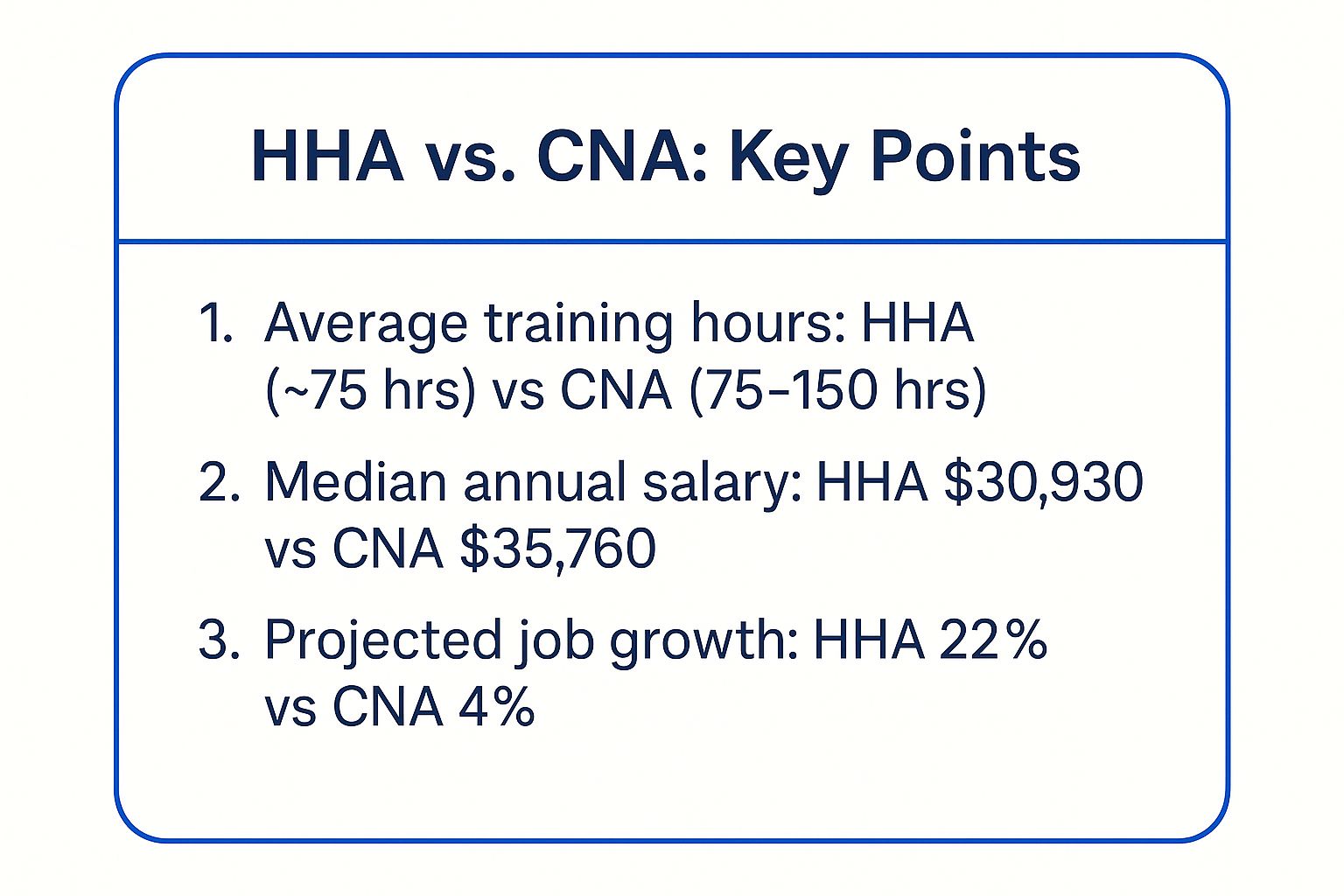The biggest difference between an HHA and a CNA really boils down to two things: where they work and what they do day-to-day.
Think of it like this: Home Health Aides (HHAs) are experts in personal, one-on-one care inside a client's own home. They focus on companionship and support. In contrast, Certified Nursing Assistants (CNAs) typically handle more clinical tasks under a nurse's watch in places like hospitals or nursing homes.
So, the real question is, what kind of environment suits you best? Do you prefer the intimacy of a home setting or the structured, team-based pace of a medical facility?
Comparing HHA and CNA Career Paths
If you're looking to start a career in caregiving, you’ll quickly run into a common fork in the road: Home Health Aide or Certified Nursing Assistant? Both roles are incredibly rewarding and centered on improving people's lives, but they take you down different paths with unique training, responsibilities, and work settings.
Getting clear on these distinctions is the first step to figuring out where your skills and passions truly fit.
HHAs are specialists in home-based care. Their entire focus is on helping clients live safely and independently in the comfort of their own homes. This means helping with Activities of Daily Living (ADLs)—things like bathing, dressing, and meal prep—along with offering companionship and light housekeeping.
CNAs, on the other hand, operate within the larger healthcare system. You'll find them in hospitals, rehab centers, and long-term care facilities. Their training is more medically focused, preparing them to take vital signs, assist with medical equipment, and meticulously document a patient's condition for the rest of the nursing team.
HHA vs CNA At a Glance
To make it simple, let's break down the main differences between these two vital caregiving professions in a quick-reference table.
| Aspect | Home Health Aide (HHA) | Certified Nursing Assistant (CNA) |
|---|---|---|
| Primary Work Environment | A client's private residence or an assisted living facility | Hospitals, nursing homes, and other long-term care facilities |
| Main Focus | Personal care, companionship, and support with daily living | Basic clinical duties and patient care under direct supervision |
| Typical Training Hours | Around 75 hours, though it varies by state | 75 to 150+ hours, which includes hands-on clinical practice |
| Supervision | Often works independently, with periodic check-ins from a nurse | Works directly under the supervision of a Registered Nurse (RN) or Licensed Practical Nurse (LPN) |
This table gives you a clear, side-by-side look, but a visual can often tell an even better story.
The infographic below really puts the training, salary, and job growth data for both roles into perspective.

As you can see, while both careers are in high demand, the need for HHAs is projected to grow much faster. This directly reflects the increasing desire for seniors and others needing care to remain in their own homes—what's often called "aging in place."
A Day in the Life Comparing Daily Responsibilities

To really get a feel for the HHA vs. CNA debate, you have to imagine what a typical day looks like for each. While both roles are built on a foundation of compassionate care, their daily routines and the environments they work in are worlds apart. It all comes down to the setting and the specific duties they perform.
An HHA’s day flows with the rhythm of a client’s personal life right in their own home. It’s a job defined by a deep one-on-one connection, focused on helping someone maintain their comfort and independence. On the other hand, a CNA’s day is mapped out by the fast-paced, structured demands of a clinical facility and a list of multiple patients to care for.
The Home Health Aide Experience
Picture this: you arrive at your client’s home in Princeton first thing in the morning. Your first job is to help them with their morning routine—maybe assisting with bathing, getting dressed, and grooming. After that, you head to the kitchen to prepare a healthy breakfast that fits their specific dietary needs.
The rest of the day is a mix of personal support and keeping the home running smoothly:
- Providing gentle reminders to take prescribed medications at the right times.
- Tackling light housekeeping, like doing a load of laundry or tidying up the living room to keep things safe and comfortable.
- Helping your client get around, whether it’s moving from the bed to a chair or joining them for a short walk outside.
- Offering companionship, which could be anything from reading a book aloud, playing a game of cards, or just sitting down for a good conversation.
The heart of an HHA's role is building a genuine, personal relationship. Their work is very autonomous, which means they need to be proactive and flexible within the private, intimate setting of a client’s home.
The Certified Nursing Assistant Experience
Now, let’s switch gears. Imagine a CNA starting their shift at a bustling skilled nursing facility. The day kicks off with a team meeting where nurses give updates on all the patients. From that moment on, the pace is quick and highly structured, driven entirely by clinical needs.
A CNA's day is a constant cycle of direct patient care and working with a larger team:
- Making rounds to check on multiple patients, taking and recording vital signs like blood pressure, temperature, and pulse.
- Assisting patients with personal hygiene, which could involve bathing, changing bed linens, and helping with toileting.
- Carefully documenting every observation and care activity in official charts for the nursing staff to review.
- Responding to call lights and helping nurses with medical procedures or setting up equipment.
The key difference truly is the environment. An HHA is zeroed in on one person's holistic well-being in a familiar, comfortable space. A CNA, however, is a vital part of a medical team, focused on the immediate health needs of many patients in a clinical setting. Understanding this distinction is the first step in figuring out which path is the right fit for you.
Comparing Training, Certification, and Scope of Practice

The titles "HHA" and "CNA" are more than just letters—they represent two very different educational paths and legally defined boundaries of care. If you're looking to start a career in caregiving here in New Jersey, getting a handle on these differences is the first step to figuring out which role is the right fit for you.
An HHA’s training is tailor-made for the home environment, focusing on personal care, safety, and helping clients maintain their independence. In contrast, a CNA's education is broader and more clinical, getting them ready for the fast-paced, medically focused settings of hospitals and nursing homes.
Training Pathways: An Overview
The training requirements for HHAs and CNAs really highlight the different worlds they work in. New Jersey regulates both paths to ensure high-quality care, but the time commitment and what you learn are quite distinct.
Home Health Aide (HHA) Training:
- Duration: In New Jersey, HHA programs require at least 76 hours of training. This is a mix of classroom instruction and hands-on, supervised experience.
- Curriculum Focus: The coursework is all about mastering the skills needed for in-home care. Think personal hygiene assistance, meal prep and nutrition, home safety, and how to communicate with compassion to clients and their families.
Certified Nursing Assistant (CNA) Training:
- Duration: CNA programs are more intense, demanding a minimum of 90 hours of training. A big chunk of this time is spent in a real healthcare facility doing hands-on clinical work.
- Curriculum Focus: You’ll cover all the basics an HHA learns, but with a heavy dose of clinical skills. This includes taking vital signs, infection control, basic nursing procedures, and proper medical documentation.
The real split is the level of medical training involved. A CNA's education is a direct on-ramp to the clinical side of healthcare. An HHA's training, on the other hand, hones the very specific skills needed to help someone thrive in their own home.
Scope of Practice: The Legal Boundaries
The training each professional gets directly shapes their scope of practice—that is, the set of tasks they are legally allowed to perform. This is probably the most important difference to understand when comparing an HHA and a CNA.
An HHA’s role is strictly non-clinical. They are the experts in helping with Activities of Daily Living (ADLs) but are legally barred from performing medical tasks. A perfect example is medication: an HHA can remind a client to take their medicine, but they can't actually administer it.
A CNA, however, works under the direct supervision of a nurse and has a much wider scope. They can handle tasks like measuring vital signs, collecting specimens for testing, and helping with certain medical equipment. It’s this clinical capability that makes CNAs so vital in places that require constant medical oversight, as they perfectly bridge the gap between personal support and nursing care.
Where You’ll Work and Where You Can Go
The environment you work in every day doesn't just define your job; it shapes your entire career path. When you look at where HHAs and CNAs spend their time, the differences between these two roles become crystal clear. Each has its own distinct setting, complete with unique challenges and opportunities for growth.
A Home Health Aide works almost exclusively inside a client's home. This isn't just a workplace—it's someone's personal space, which fosters a deep, one-on-one connection. HHAs often have a lot of autonomy, shaping their daily schedule around their client’s specific needs and routines. This creates a flexible, less rigid work life built on trust and personal relationships.
On the other hand, a Certified Nursing Assistant is a vital part of a much larger clinical team. You’ll typically find CNAs in bustling, fast-paced places like hospitals, rehabilitation centers, and skilled nursing facilities. Their work is structured, collaborative, and directly supports doctors and nurses in delivering medical care to many patients at once.
Future Demand and Career Growth
Both HHAs and CNAs are in incredibly high demand, but they're on different growth trajectories. The future for HHAs, in particular, is booming thanks to a major shift in how and where people want to receive care.
The need for Home Health Aides has exploded as our population ages and more people choose to receive care at home. In fact, the demand for HHAs is projected to grow by 21% over the next decade—that's significantly faster than the average for most jobs. This surge is happening because about 17.5% of the U.S. population is now 65 or older, and that number is only going up. You can learn more about what’s driving this demand on IntelyCare.com.
While the HHA field is growing rapidly, the CNA role offers a more traditional, clear-cut path for clinical advancement. For many, becoming a CNA is the first step on the ladder toward a nursing career.
Key Takeaway: The HHA path is perfect if you’re looking for a career built on personal connection and want to be part of the fastest-growing sector in healthcare. The CNA path is the way to go if your end goal is to climb the clinical ladder in a hospital or facility setting.
This difference is crucial when you're mapping out your future. The HHA vs CNA choice really comes down to whether you prefer the independence and personal touch of in-home care or the structured advancement that comes with working in the medical system. Many CNAs use their hands-on clinical training as a direct stepping stone into LPN or RN programs.
Salary Insights and Earning Potential

Let's talk about one of the most important factors in any career decision: your paycheck. When you're weighing a path as a Home Health Aide (HHA) against becoming a Certified Nursing Assistant (CNA), it’s crucial to have a realistic grasp of the earning potential for both roles.
While both careers offer a reliable income in a field that's only growing, CNAs often see a slightly higher starting wage. This really comes down to their clinical training and certification, which opens doors to more structured medical settings and a broader scope of practice.
But the starting number is just one part of the story. Your earning potential isn't set in stone. Things like where you work in New Jersey, the type of employer—a private home care agency versus a bustling hospital—and your years on the job will all shape what you take home. For instance, a CNA in a high-demand hospital might earn more, but an HHA with a consistent private client could enjoy a more predictable schedule.
Unpacking the Numbers
So, what can you realistically expect to make? Generally speaking, CNAs tend to earn a bit more on a national level because of their medical credentials. Their skills are indispensable in facilities that need round-the-clock clinical support, and that demand is often reflected in their pay.
Certified Nursing Assistants are a cornerstone of the healthcare system, and the job market for them is solid. Nationally, the average CNA brings in about $38,130 a year, which breaks down to $18.33 per hour. With a projected job growth of 4-5% through 2032, this career path is driven by the ongoing needs of our aging population. You can get more details about the CNA job outlook on VitaliPartners.com.
While a CNA might start with a higher hourly rate, an experienced HHA working for a high-quality agency or with private clients can often close that gap, especially if they have specialized skills in areas like dementia care.
Factors That Influence Your Paycheck
Your salary is dynamic, not static. Several key variables can give your income a real boost in either role, especially here in the New Jersey market where skilled caregivers are in high demand.
- Location: Pay in more populated areas, like Mercer County, is often higher to account for the cost of living. It just costs more to live there, so wages adjust accordingly.
- Employer Type: A CNA working in a hospital might have a higher hourly rate, but an HHA with a dedicated, long-term private client could have a more stable annual income.
- Experience & Specialization: The longer you're in the field, the more you're worth. Earning extra certifications in specialized areas, like hospice care or working with clients who have disabilities, makes you an even more valuable professional and can significantly increase your earning potential.
When you look at the HHA vs. CNA salary question, you see it’s not a simple one-or-the-other answer. Your decision should be a balance between what you can earn right away, your long-term career ambitions, and the kind of work environment where you truly see yourself thriving.
How to Choose the Right Career Path for You
Deciding between becoming an HHA or a CNA isn't just about comparing job descriptions on paper. It's about matching your personality, your strengths, and what you want out of a career with the right work environment. The best way to find your fit is to be honest with yourself about what truly drives you.
Think about where you see yourself working. Do you love the idea of working independently, building a strong, one-on-one relationship with a single client in their own home? Or do you get your energy from a busier, more structured setting like a hospital or nursing home, where you’re part of a larger medical team caring for many patients at once?
Finding Your Fit with a Little Self-Reflection
When it comes to the HHA vs CNA decision, your gut and your personality are your best guides. Asking yourself these questions can bring a lot of clarity:
- Autonomy vs. Structure: Do you work best when you have the freedom to manage your own schedule within a client's home? Or do you prefer the clear-cut routines and team dynamic you'd find in a clinical facility?
- Relationship Depth: Are you someone who thrives on creating a deep, long-term bond with one person, becoming a trusted part of their daily life? Or do you enjoy the variety of interacting with many different patients and fellow healthcare workers throughout your day?
- Career Trajectory: Are you looking for a fulfilling role focused on providing compassionate in-home care, or is this the first step on a path to becoming a nurse (like an LPN or RN)?
The HHA path is often perfect for people who value independence, a flexible schedule, and the deep satisfaction that comes from a one-on-one connection. The CNA role is a better fit for those drawn to the clinical side of healthcare, who enjoy being part of a team and have their sights set on advancing in the medical field.
At the end of the day, the right career is one that uses your skills and feels right for you. The HHA role offers a deeply personal way to make a difference in someone's life, while the CNA path opens the door to the wider world of healthcare. Both are incredibly important and rewarding careers built on a foundation of compassionate care.
Your Top HHA and CNA Career Questions, Answered
As you weigh the differences between becoming an HHA or a CNA, a few key questions always seem to pop up. Let's dig into some of the most common ones to give you a clearer picture of these two vital caregiving roles.
Can an HHA Work in a Hospital?
This is a great question, and the answer isn't a simple yes or no. While the roles are designed for different settings, you'll sometimes see a little overlap.
CNAs, with their clinical skills, are sometimes hired for home health cases, especially when a client has more complex medical needs. On the flip side, some hospitals might hire aides for roles very similar to an HHA, but they usually give them a different title, like Patient Care Technician.
The important thing to remember is that the certifications aren't interchangeable. A CNA can generally work as an HHA, but an HHA can't just step into a CNA role. To work as a Certified Nursing Assistant, you have to complete the full CNA certification program.
Which Role is a Better Stepping Stone to Becoming a Nurse?
If your long-term goal is to become a Licensed Practical Nurse (LPN) or a Registered Nurse (RN), the CNA path is the more direct route. The clinical training, daily exposure to medical terminology, and hands-on experience in a fast-paced healthcare facility build a much stronger foundation for nursing school.
In fact, many nursing programs right here in New Jersey either require or strongly recommend having your CNA certification before you even apply. While HHA experience is fantastic for developing patient-care skills, it just doesn't provide the direct clinical exposure that is at the heart of a nursing curriculum.
How Do the Emotional and Physical Demands Compare?
Both jobs are physically demanding—there's no doubt about that. You'll often be lifting, transferring, and helping patients with their mobility. Where they really differ is in the emotional demands.
As an HHA, you often build a deep, long-term bond with one client and their family. This can be incredibly rewarding, but it also comes with its own emotional challenges, especially when you're providing end-of-life care.
A CNA, on the other hand, juggles the stress of a busy clinical setting with many different patients. You face the emotional weight of acute injuries and chronic illnesses on a much larger scale. Your choice really comes down to what kind of environment you thrive in: one built on a deep personal connection, or a dynamic, team-based medical setting.
At NJ Caregiving, we know how important it is to find the right fit for our clients and our team members. If you're feeling inspired to build a meaningful career in home health care, we'd love for you to explore our opportunities at https://njcaregiving.com.


